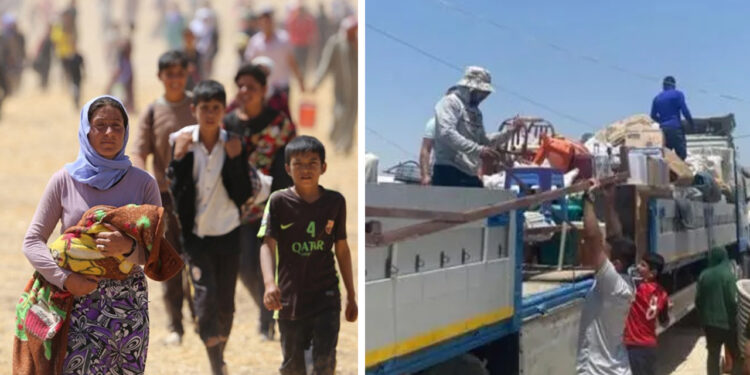Last week, 108 Yazidis returned to their homes and lands in Sinjar (Shengal) in Iraq, nine years after being displaced due to brutal attacks at the hands of the Islamic State (ISIS).
The refugees had been staying in refugee camps in Duhok in the Kurdistan Region of Iraq (KRI), and returned to Sinjar with the support of Iraq’s Ministry of Migration and Displaced Persons. Earlier in June, 59 other Yazidi families also returned to their ancestral homelands.
Sinjar, one of Iraq’s disputed territories which lies outside the Kurdistan Region, suffered brutal attacks at the hands of ISIS in 2014, leading to the persecution of thousands of Yazidis. This tragic event forced numerous Yazidis to flee their homes and seek refuge in camps in Duhok.
Currently, the majority of this ancient community are refugees, either residing in Western countries or living as internally displaced persons (IDPs) within the region’s refugee camps. The IDP camps have struggled to provide adequate services, and according to Yazidi journalist İbrahim Êzidî, the Kurdistan Democratic Party (KDP), the region’s dominant power, has been encouraging Yazidis to relocate to Europe.
A good 90 percent of camp residents have previously expressed their desire to return home due to worsening sanitary conditions, heating issues and the constant risk of tent fires.
The Autonomous Administration of Sinjar has issued numerous statements stressing that all necessary preparations have been concluded to facilitate the return of refugees to their respective lands in Sinjar.
One of the factors hindering the return of the Yazidis is that the region remains under the threat of Turkish offensives, often seemingly condoned or directly supported by the KDP.
Yazidis have become targets in Turkey’s military operations due to their association with the Kurdistan Workers’ Party (PKK), which aided many community members in escaping ISIS attacks by defending a humanitarian corridor out of Sinjar while the KDP and other Iraqi forces fled, leaving the region vulnerable to takeover by the fundementalist group. The PKK also assisted the Yazidis in forming their own defence forces, namely the Sinjar Resistance Units (YPŞ) and Êzîdxan Women’s Units (YJÊ).
“Turkey aims to subject Yazidis to another genocide by exerting pressure on the Iraqi government through the KDP,” Êzîdî told Mezopotamya Agency in a 2022 interview, referring to the Sinjar Agreement signed between the KDP and the Iraqi government in October 2020 with the support of Turkey. The agreement fails to acknowledge Yazidi self-administration within the region.










